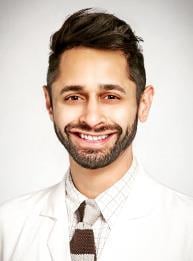As a medical student, do you ever wonder what it’s like to be an endocrine surgeon? Here’s your chance to find out.
Meet Vikram D. Krishnamurthy, MD, an endocrine surgeon and featured physician in AMA Wire’s® “Shadow Me” Specialty Series, which offers advice directly from physicians about life in their specialties.
Read his insights to help determine whether a career in endocrine surgery might be a good fit for you.
“Shadowing” Dr. Krishnamurthy
Specialty: Endocrine surgery
Practice setting: Academic group practice in a health system of 10 hospitals and 18 ambulatory centers
Years in practice: 1 year
A typical day in my practice:
Life during training is a lot different from life after fellowship. During general surgery residency, workweeks are usually 80 hours per week on rotations involving abdominal, oncologic, cardiovascular, thoracic, pediatric and trauma surgery. Endocrine surgery is focused on surgical conditions of the thyroid, parathyroid glands, adrenals, and neuroendocrine tumors of the pancreas and gastrointestinal tract. Workweeks during fellowship are typically around 50-60 hours per week with very limited night and weekend demands.
After training, a typical week for most academic surgeons involves a couple days of surgeries, a couple days of clinic and one day (or half day) of administrative activities (protected time for academic, educational and research interests).
For example, my workweek includes two days of OR, two days of clinic and one administrative day. A day in the OR (which can last from 7 a.m. to 4 p.m.) can involve three cases, ranging from thyroidectomies to lateral neck dissections to laparoscopic adrenalectomies. A day in the clinic (which is usually 8:30 a.m. to 3:30 p.m.) involves seeing 12-20 patients and performing ultrasounds, biopsies and laryngoscopies. Administrative days include lecturing students, meeting with residents and conducting research.
It should be stated that when you work in academic surgery, you are expected to attend weekly conferences at your home institution and national meetings throughout the year to contribute to the academic community. This can add to the overall time you spend “working.” Fortunately, most endocrine surgeons enjoy these activities, so it feels like a calling rather than an obligation.
As endocrine surgery gains recognition as a distinct specialty, an increasing number of fellowship graduates are entering non-academic community practices. This is indubitably beneficial to patients but also provides a new dimension to the field and new opportunities for those interested in becoming endocrine surgeons. These graduates are more likely to continue to perform general surgery procedures, in addition to endocrine operations, in their practices.
The most challenging and rewarding aspects of caring for patients in endocrine surgery:
Endocrine surgeons are specialists who manage both routine and complex pathology. Thus, in addition to common patient presentations, we also treat advanced cases referred by non-fellowship trained surgeons or smaller hospitals. We also see and operate on patients who had aborted or failed operations by other surgeons, which makes patient education and re-operation more difficult.
Fortunately, our training prepares us for this challenge, and continued mentorship throughout our career gives us the confidence and support to help these patients. The most rewarding part of our specialty is probably two things: (1) providing excellent oncologic outcomes that preserve functional capacity (e.g., voice) and optimize cosmesis and (2) reversing the debilitating effects of various tumors that produce excessive hormones.
Three phrases that describe the typical physician in endocrine surgery:
- Detail-oriented, overachievers
- Inquisitive investigators and educators
- Friendly and communicative
How my lifestyle matches or differs from what I envisioned in med school:
After training, endocrine surgery has allowed me to experience a healthy work-life balance. Most operations take one to four hours, and the majority of patients stay one night in the hospital and are discharged home the next day. This makes for a relatively light inpatient census and little need for clinical work on weekends.
True endocrine surgery emergencies are rare; thus, nights and weekends are relatively free to work on academic pursuits and personal interests. My career has allowed me to have a vibrant professional and personal life filled with achievements, travel and time with loved ones. Furthermore, research shows that more than 95 percent of endocrine surgery fellowship graduates are satisfied with their jobs (approximately 50 percent are women and 50 percent men), speaking to ability to successfully balance professional and personal obligations.
One skill every physician in training should have for endocrine surgery but won’t be tested for on the board exam:
Perseverance, stamina, motivation (especially self-motivation), empathy and superb communication skills. Also a lifelong desire to learn and the ability to execute delicate, fine and purposeful movements in the operating room.
One question physicians in training should ask before pursuing endocrine surgery:
Am I interested in routine and complex endocrine physiology, oncology and surgery?
Six books every medical student interested in endocrine surgery should read:
- Essentials of Surgery by Peter Lawrence, MD
- Lange’s Current Diagnosis and Treatment: Surgery by Gerard Doherty, MD
- Rush University Medical Center Review of Surgery by Jose Velasco, MD, et al
- Common Surgical Diseases by Theodore J. Saclarides, MD; Jonathan A. Myers, MD; and Keith W. Millikan, MD
- Endocrine Surgery: Principles and Practice by Johnathan Hubbard, MD; William B. Inabnet, III, MD;and Chung-Yau Lo, FRCS
- Textbook of Endocrine Surgery by Orlo Clark, MD; Quan-Yang Duh, MD; Electron Kebebew, MD; Jessica Gosnell, MD; and Wen Shen, MD
Online resources students interested in my specialty should follow:
- The website of the American Association of Endocrine Surgeons
- The American Association of Endocrine Surgeons patient education website
- An explanation of the maturation of the specialty of endocrine surgery from the Cleveland Clinic
- The endocrine surgery job market: A survey of fellows, department chairs and surgery recruiters
- Mapping endocrine surgery: Workforce analysis from the last six decades
Also follow the American Association of Endocrine Surgeons on Twitter @AAES1. My Twitter handle is @healthyroidsurg.
A quick insight I’d give students who are considering endocrine surgery:
Stay open-minded during your general surgery training and also consider surgical oncology, colorectal, hepatobiliary and breast surgery. Seek mentorship and research opportunities early on.
If I had a song or two to describe my life in this specialty, they’d be:
“Hall of Fame” by The Script and “Such Great Heights” by the Postal Service
Want to learn more about your specialty options?
- Read more profiles in AMA Wire’s "Shadow Me" Specialty Series to learn additional insights from physicians in such specialties as neurology, nephrology, otolaryngology, vascular surgery and infectious disease, among others.
- Check out the FREIDA Specialty Guide.
- Be sure to avoid these 5 common mistakes students make when choosing a specialty.




